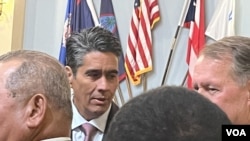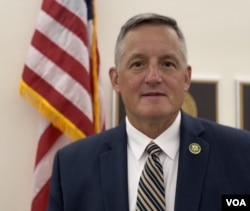Beijing has scored significant diplomatic gains in the Indo-Pacific lately, but one country in the western Pacific so far has said no.
"The most important thing is we have shared values; we believe in freedom and democracy," said Surangel W. Whipps Jr., president of the Republic of Palau, when asked how he justifies turning down attractive offers from Beijing in favor of sticking with the United States and its Indo-Pacific allies.
"It's important that our citizens understand we're part of the U.S. family."
Speaking to VOA on the sidelines of a U.S. House of Representatives hearing, Whipps said, "We're away on the western tip, but we're part of the U.S. family, and we believe that."
During the hearing, Whipps recalled what President Ronald Reagan said at the time when the Freely Associated States were established: “You’ll always be family to us.”
Whipps was in Washington to testify at both Senate and House hearings on the Biden administration's proposed Compact of Free Association Amendments Act of 2023.
Palau, along with Micronesia and the Marshall Islands, make up the three Freely Associated States, a status that grants the U.S. exclusive military access to the three independent nations. In exchange the U.S. provides security guarantees and economic support to the three, but the nations decide their own foreign policies.
Palau is one of a limited number of states that recognize Taiwan, a close partner of the United States. China, meanwhile, has made it clear to the Pacific nation that rewards abound should it decide to flip its diplomatic recognition to Beijing.
"'Join us, denounce Taiwan, and the sky is the limit.' That is what's been told to us," Whipps told VOA.
He acknowledged that there's no denying the material benefits – while they lasted – to the local economy, such as tourists from China: "Boats are full, hotels are full, fishermen were happy."
"But we have also seen that after that happened and we did not denounce our relationship with Taiwan, they decided to turn the spigot off, or reduce the number of visitors coming to Palau.
"Living through that and understanding that type of relationship where one party makes it clear that they want the partnership but does so by beating the other into it” —whoever does this, he said, “is probably not a good partner."
"It's important that our people be reminded that a true partner is a partner that is there all the time. … United States has been there for us for 80 years. There's no reason why we should look elsewhere."
Republican Representative Bruce Westerman heads the House Committee on Natural Resources, which led the hearing on Tuesday. Asked if Washington ought to be more forthcoming in providing support to nations like Palau, Westerman said, "I feel much stronger about supporting our allies and those who have the same world view and vision that America does."
Westerman said at a May hearing examining U.S. interests in the Indo-Pacific that "China's threat looms large over the national security interests of the United States and the world. In the Indo-Pacific, recent [Chinese] aggressions make our territories more important than ever before. As China routinely provokes these territories and encroaches into their waters, we must maintain our strategically crucial engagement in the area through our agreements with the Freely Associated States."
Regional allies
Whipps underscored another facet of relations with the U.S. and countries with shared values.
"Most importantly, we have friends in the region: Japan, Korea, Taiwan and Australia; we all share in promoting a free and open Indo-Pacific, and most important – preserving our freedom and democracy. It's important we work with them to keep our Pacific peaceful and prosperous."
To preserve peace and build prosperity, Whipps says, his country would welcome a greater U.S. military presence, believing "presence is deterrence."
Since 2020, Chinese boats have been in his country's waters "three times," Whipps told VOA, each time featuring a different ship, all doing surveys.
Asked if his country would like to see more U.S. Navy and Coast Guard visits, he replied: "Absolutely."
'Part of the homeland'
In the event the U.S. Coast Guard is conducting missions elsewhere, "The U.S. Navy is around, we want them to show up, and show that they are there, because this is part of the homeland, and we shouldn't have people that are uninvited in our waters conducting activities that may infringe on the security of our nations," Whipps said.
One of the things Palau and the United States have been discussing, Whipps told VOA, is improving ports and airports in the Western Pacific nation to better facilitate visits, and access, by U.S. vessels and aircraft.
Whipps makes clear that economic co-prosperity is crucial to strong strategic partnerships, and he hopes to see the negotiations between his country and the other two associated states with Washington conclude and be ratified by Congress soon.
"The agreement's passing in a timely manner helps reassure our people of the importance of the relationship, that we're family and we support each other."
Whipps told VOA that support from the United States is crucial to helping his people recover from losses due to COVID and China’s calculated reduction of tourism.
He said a key to the region's security will be continued U.S. investment backed by the U.S. Development Finance Corporation, which works to bolster U.S. public-private joint investment initiatives.
It is important that the agreement now under discussion has money for infrastructure, he said. "Whether it's water systems, roads, hospitals, all those things we need to help develop a strong economy."





